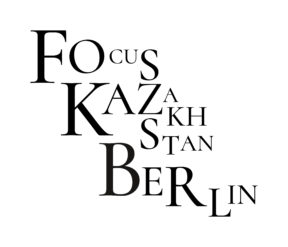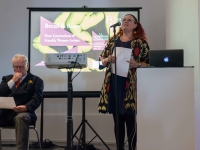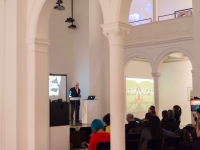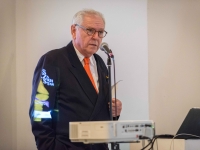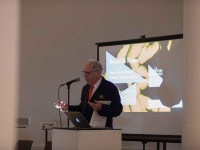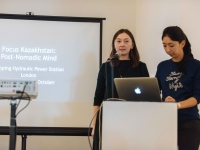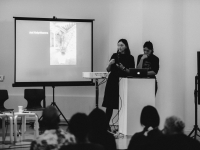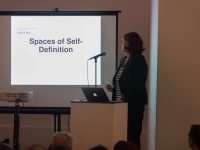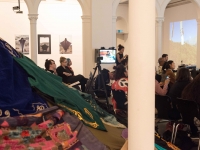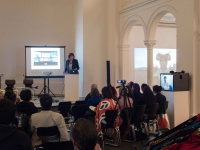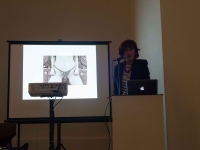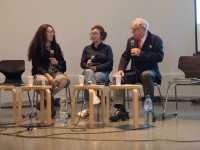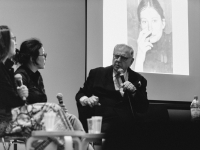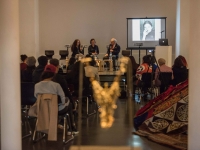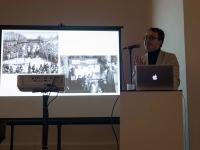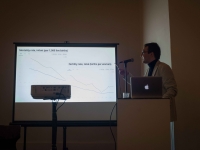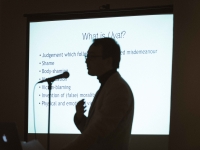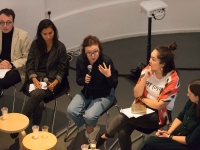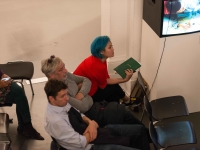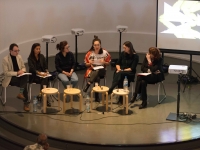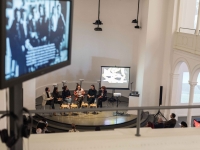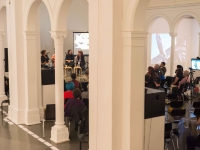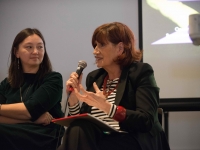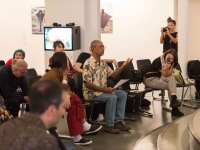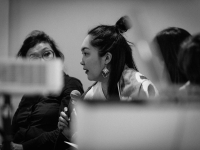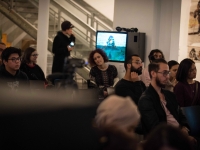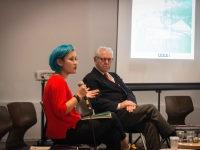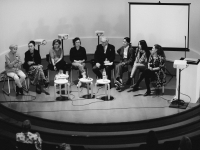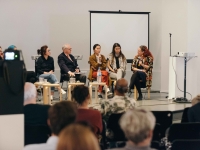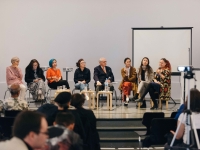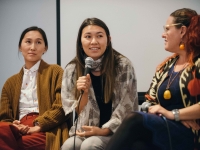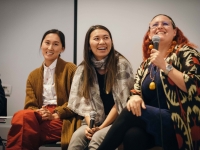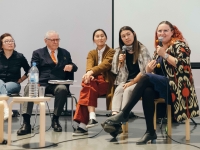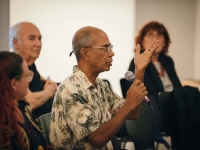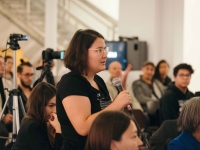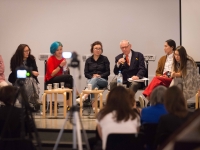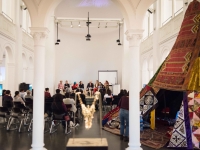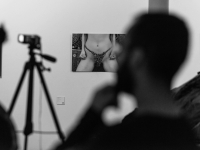SYMPOSIUM
Sunday 30 September @ 3 – 7pm
At MOMENTUM
Kunstquartier Bethanien, Mariannenplatz 2, 10997 Berlin
Part of the Exhibition:
Bread & Roses
Four Generations of Kazakh Women Artists
PARTICIPANTS:
David Elliott, Almagul Menlibayeva, Rachel Rits-Volloch:
Curators of Focus Kazakhstan Berlin – Bread & Roses: Four Generations of Kazakh Women Artists and the Focus Kazakhstan Artist Residency Exhibition (2018)
Aliya de Tiesenhausen and Indira Dyussebayeva:
Curators of the Focus Kazakhstan London exhibition Post-nomadic Mind (2018)
Diana T. Kudaibergenova:
Sociologist and scholar at Cambridge University
Dina Nurpeissova:
Founder of Berlin’s Central Asian cultural association Steppenboot
Nari Shelekpayev:
Einstein Fellow at Berlin’s Einstein Forum and Visiting Professor at the University of Rome
Bojana Pejić:
Curator of Gender Check: Femininity and Masculinity in the Art of Eastern Europe (2009/10), Good Girls: Memory, Desire, Power (2013), and co-curator of HERO MOTHER: Contemporary Art by Post-Communist Women Rethinking Heroism (2016)
Anar Aubakir, Gaisha Madanova, Aigerim Ospanova, Saule Sulemeinova, Gulmaral Tatibayeva:
Artists in Bread & Roses: Four Generations of Kazakh Women Artists and the Focus Kazakhstan Artist Residency Exhibition
PROGRAM:
3:00
David Elliot
Bread & Roses: Colonization and Identity in Kazakh Art
3:30
Aliya de Tiesenhausen & Indira Dyussebayeva
On “Post-Nomadic Mind” (London) and the Current Discourse on Contemporary Art and Identity in Kazakhstan
4:00
Bojana Pejic
Spaces of Self-Definition: on Theories of Identity
4:30
Discussion: Knowing Lidya Blinova
Almagul Menlibayeva, Saule Sulemeinova, David Elliott (moderator)
Knowing Lidya Blinova
5:00
Nari Shelekpayev – Shame, Power, and the Female Body: on Political Practices of Uyat in Contemporary Kazakhstan
5:20
Panel Discussion: Naming Shame: Uyat in Kazakh Culture
Nari Shelekpayev, Bojana Pejic, Aliya de Tiesenhausen, Almagul Menlibayeva, Diana T. Kudaibergenova, Indira Dyussebayeva, Dina Nour (moderator)
Artist Talks:
6:00
Aluan: Exhibition on Paper
Gaisha Madanova in discussion with David Elliott on Aluan and how it fits into her practice as artist and curator.
6:15
From the Perspective of Now: Two Generations of Kazakh Women Artists
Almagul Menlibayeva, Gaisha Madanova, Anar Aubakir, Aigerim Ospanova, Saule Sulemeinova, Gulmaral Tatibayeva, Rachel Rits-Volloch & David Elliott (moderators)
7:00
Symposium Closes.
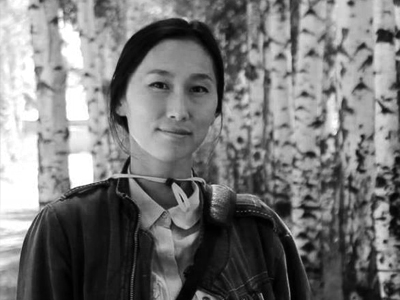
ANAR AUBAKIR
Anar Aubakir: Born 1984 in Pavlodar, Kazakhstan. Lives and works in Astana, Kazakhstan. Anar Aubakir’s paintings, often shown in complex installations, emanate a disquieting poetic symbolism that, while referring to stories and relationships she has encountered in Kazakhstan, suggest a much broader reference. She completed an MA at the Kazakh National Academy of Arts in Almaty; in 2010 she won the best realist painting award in the Russian Art Week competition in St. Petersburg as well as the 1st painting prize in the Week of Kazakhstan Art competition in Almaty. Her work was awarded the Cholpan-Ata City Award in Kyrgyzstan in 2016. She is also the organizer of the first traveling exhibitions to have taken place since Kazakhstan became independent. From 2013 to 2017, she organized more than a dozen exhibitions, in which over 20 artists participated, which have travelled to Pavlodar, Semey, Aktobe, Atyrau, Kostanay, Karaganda, Temirtau, Kokshetau, Petropavlovsk, Ust-Kamenogorsk, Aktau and Astana. In each of the cities she conducted master classes in painting and interdisciplinary art. Solo exhibitions of her work have been held in Almaty (2010) and Astana (2015.) Her works are in museum collections in Kazakhstan and Tatarstan.
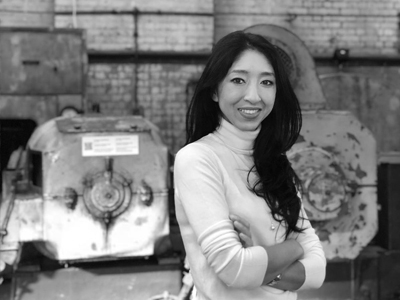
INDIRA DYUSSEBAYEVA
Indira Dyussebayeva-Ziyabek is an independent curator and co-founder of Interntional Art Development Association (IADA), a non-profit organisation supporting and promoting contemporary art from Kazakhstan and Central Asia. Indira studied History of Art at University College London (UCL) and holds an MSc in Finance from Cass Business School, City University London. In her early career, she worked for several years in the financial services industry. With IADA, Dyussebayeva has organised numerous international projects. She co-curated the collateral exhibition of Kazakhstan, ONE STEP/PE FORWARD at the 55th Biennale of Venice (2013), as an initiative for the creation of the national pavilion of Kazakhstan. She curated the solo show of British-Israeli artist Zadok Ben-David, The Other Side of Midnight (2014), which was the first international exhibition at the National Museum of the Republic of Kazakhstan. Together with her partners, she organised Protagonists, Invisible Pavilion, an artist residency for artists from Kazakhstan, during the 56th Biennale of Venice (2015). In addition, she has participated in curating projects in the non-profit sections of the Vienna Art Fair, Art Dubai, and Art 15.
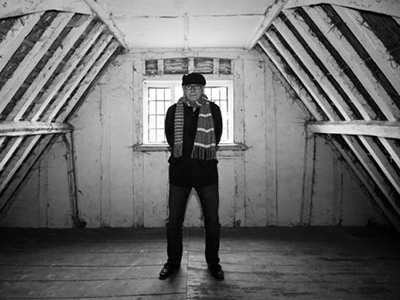
David Elliott
David Elliott is an English born curator and writer. He was Director of the Museum of Modern Art in Oxford, England (1976-1996); Director of Moderna Museet [The National Museum of Modern and Contemporary Art] in Stockholm, Sweden (1996-2001); Founding Director of the Mori Art Museum in Tokyo (2001-2006); the first Director of the Istanbul Museum of Modern Art [Istanbul Modern] (2007); Artistic Director of The Beauty of Distance: Songs of Survival for a Precarious Age, the 17th Biennale of Sydney (2008–2010); in 2012 he was Artistic Director of The Best of Times, The Worst of Times, Rebirth and Apocalypse in Contemporary Art, the 1st International Kyiv Biennale of Contemporary Art (2011-12); he was Artistic Director of A Time for Dreams, the IV International Moscow Biennale of Young Art (2014). David Elliott was the Rudolf Arnheim Guest Professor in Art History at the Humboldt University, Berlin (2008) and Visiting Professor in Museum Studies at the Chinese University in Hong Kong (2008/11/13). From 1998 until 2004 he was President of CIMAM (the International Committee of ICOM for Museums of Modern Art). He is Hon President of the Board of Triangle Art Network/Gasworks in London. A specialist in Soviet and Russian avant-garde, as well as in modern and contemporary Asian art, he has published widely in these fields as well as on many other aspects of contemporary art. In 1996 he was co-curator of Kunst und Macht im Europa der Diktatoren 1930 bis 1945 at the Hayward Gallery, London and the Deutsches Historisches Museum in Berlin and in 2000-2001 was Artistic Director of the exhibition After the Wall: Art and Culture in Post-Communist Europe at Moderna Museet, Stockholm, Ludwig Museum, Budapest and Hamburger Bahnhof, Berlin. In 2011 he curated Between Heaven and Earth. Contemporary Art from the Centre of Asia at Calvert 22, London. He is the Chief Curator of BALAGAN: Contemporary Art from the Former Soviet Union and Other Mythical Places, organized by MOMENTUM.
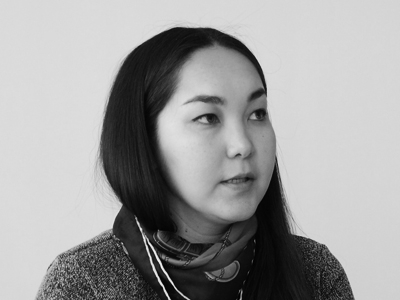
Diana T. Kudaibergenova
Diana T. Kudaibergenova is a cultural and political sociologist. She is currently a Research Fellow in the Center of Development Studies at the University of Cambridge and a Postdoctoral Fellow in the Department of Sociology of Law at Lund University, Sweden. Her main research interest concerns the social theory of power. Kudaibergenova studies different intersections of power relations through realms of political sociology, with a particular focus on nationalising regimes and nationalism in the new states of post-soviet space, cultural sociology, gender studies, and socio-legal studies. She published her first book in January 2017, Rewriting the Nation in Modern Kazakh Literature. Elites and Narratives, exploring the ways national ideas and narratives were produced, contested and rewritten in the very new genre of Soviet literature in modern Kazakhstan. Her second book, currently in production, addresses the comparative political sociology of nation-building, power struggles and new political elites in post-Soviet states. Kudaibergenova’s work on socio-legal studies of citizenship, minorities, and nation- as well as state-building is connected to this aspect of her research. She also works on gender and contemporary art fields to test similar questions of power relations, agency, and power contestations in societies that go through tremendous socio-cultural transformations.
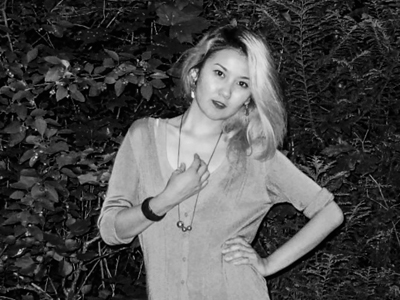
Gaisha Madanova
Gaisha Madanova was born in Alma-Ata, Kazakh Soviet Socialist Republic, in 1987. In 2009, she graduated from the Faculty of Architecture of Almaty College of Construction and Management. In 2018, she graduated from the Munich Academy of Fine Arts (Sculpture class, Prof. Hermann Pitz). Gaisha Madanova in her artistic practice using different mediums and techniques (silkscreen print, nitro-frottage, video, photo, installations) and her art is based on the questions to reveal the relationship between artificial and natural existence. Topics like watching and being watched, the body as an expression of the inner self or the strategies of transformations and displacement can be seen as links through the different series of her works. She is also engaged in the curatorial practice (special project DIYALOG: New Energies, OMV section at the VIENNAFAIR; contemporary art educational program VIDEO[ARTiFACT], Klaus vom Bruch; special project mikro[smART]raiony, Refunc group, ARTBATFEST; video-art program Internal Storage – Not Enough Space? Garage Museum of Contemporary Art) and since 2012 has been involved in different projects organized by Goethe- Institut Kazakhstan. Since 2007 Gaisha Madanova is a founding member of the international art collective Artpologist (Art+Antropology), since 2014 member of the Munich based art collective Roundabout and since 2016 co-founder of Kazakhstan based art communicational platform ARTCOM. Gaisha Madanova is the founder and editor-in-chief of the first in Kazakhstan conceptual art magazine ALUAN – EXHIBITION ON PAPER. Temporarily based between Kazakhstan and Germany.
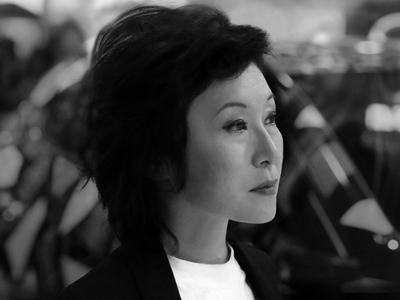
Almagul Menlibayeva
Video artist and photographer Almagul Menlibayeva holds an MFA from the Art and Theatre University of Almaty. She works primarily in multi-channel video, photography and mixed media installation and her work addresses such critical issues of post-Soviet modernity as social, economic, and political transformations in Central Asia, de-colonial re-imaginings of gender, environmental degradation, and Eurasian nomadic and indigenous cosmologies and mythologies. In conjunction with her solo exhibition ‘Transformation’ at the Grand Palais in Paris (France, 2016-2017), she was awarded the prestigious Chevalier Ordre des Arts et des Lettres by the French Minister of Culture in 2017. Other awards include the ‘Daryn’ State Prize of Kazakhstan (1996), and the ‘Tarlan’ National Award of the Club of Maecenas of Kazakhstan (2003). She was also the Winner of the Grand Prix Asia Art at the II Biennial of Central Asia, in Tashkent, Uzbekistan (1995) and the Winner of the Main Prize of the International Film Festival Kino Der Kunst (2013) in Munich, Germany. Menlibayeva has gained international recognition by participating in: the Venice Biennale, Italy (2005, 2007, 2009, 2015); Sydney Biennale, Australia (2006, 2012); the Sharjah Biennial, UAE (2010); the Mediterranean Biennale, Israel (2010); the Moscow Biennale, Russia (2011, 2015); the Kiev Biennial, Ukraine (2013); the Daegu Photo Biennale (2016); and the Gangwon International Biennale, South Korea (2018). Selected solo exhibitions include: Videoart at Midnight #98: Almagul Menlibayeva, Berlin (2018); Transformation, Grand Palais, Paris, France (2016-2017); Union of Fire and Water, 56th Venice Biennial, Italy (2015); Transoxiana Dreams, Videozone, Ludwig Forum, Aachen, Germany (2014); An Ode for the Wastelands and Gulags, Kunstraum Innsbruck, Austria (2013); Daughters of Turan, Casal Solleric, Palma De Mallorca, Spain (2012); LATT: Europe at large #6, Museum van Hedendaagse Kunst (M HKA), Antwerp, Belgium (2010); Kissing Totems, Priska C. Juschka Fine Art, New York, USA (2008). Recent selected group exhibitions include: Haifa Museum, Israel (2018); Neues Museum in Nuremberg, Germany (2018, 2016); Astana State Museum, Kazakhstan (2018, 2016); Museum van Hedendaagse Kunst, M HKA, Antwerp, Belgium (2017-2020, 2010); National Museum of Contemporary Art, Athens (EMST), Greece (2017).
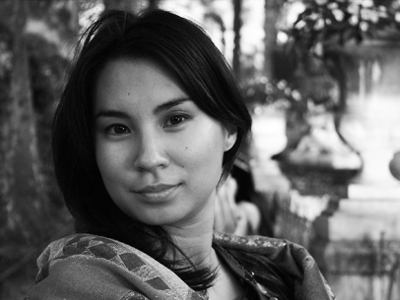
Dina Nurpeissova
Born in 1983 in Almaty, Kazakhstan, Nurpeissova has been based in Berlin since 1999. She studied history of art, musicology and cultural sciences at the University of Tübingen, and La Sapienza in Rome. She has worked at cultural festivals in Europe and Kazakhstan: Hors Pistes (Centre Pompidou, Paris), Astana Art Fest (Kazakhstan), Ruberoid (Acud Macht Neu, Berlin), Panke Parcours. She is the founder of the cultural association “Steppenboot e.V.” in Berlin. She is also a musician and DJ.
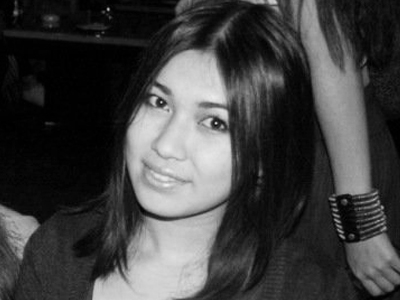
Aigerim Ospanova
Aigerim Ospanova: Born 1991 in Astana, Kazakhstan. Lives and works in Kazakhstan. Multimedia artist Ospanova Aigerim graduated with a BA from the Academy of Art in Almaty. Aigerim’ practice extends to installation, performance art, painting and video art. Selected exhibitions include: “India” in Almaty; “Beautiful Place Burabai” in Almaty; the open-air exhibition of young artists organized by the Union of artists of Almaty; “Always life” Central State Museum of Almaty; “Exhibition of the young artists”, contemporary art festival “Artbat Fest7”, Almaty; “Astana ArtFest”, Astana; “QWAS” bilocal transcultural exhibition, Zurich-Almaty; “Act of creation” contemporary art festival “Artbat Fest8”, Almaty; “Time and Astana: after future”, State Museum, Astana. Aigerim was invited to the symposiums: “Sacral folk songs” (Elabuga, Russia); “Images of Place and Time” (Khanty-Mansiysk, Russia); Art symposium “Made in Astana” (Astana, Kazakhstan); “Sheich Zayed Festival” (Abu-Dhabi, UAE). Also she participated in video project “Transformation” by Almagul Menlibaeva; in the video-performance “The Bitter Gift” by Askhat Akhmediyarov; in workshop on performance with Waldemar Tatarchuk (Labyrinth Gallery, Polland), 2017 Kazakhstan; and in workshop on performance with Roger Hill (UK) Almaty Art Center, 2017 Almaty Kazakhstan.
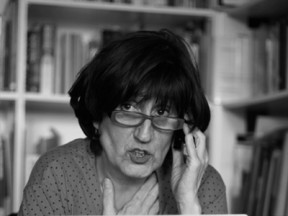
Bojana Pejić
Bojana Pejić (b. 1948 in Belgrade, Yugoslavia) is an art historian, writer, curator, and educator. From 1977 to 1991 she was curator at the Student Cultural Center of Belgrade University. Since 1991, she has been based in Berlin. She was guest professor at the Humboldt University in Berlin (2003), at the Institute for Cultural Studies at the University in Oldenburg, Germany (2006/2007), and at the Central European University, Faculty of Gender Studies, in Budapest (Winter 2013). She was chief curator of the exhibition After the Wall – Art and Culture in post-Communist Europe (1999), organized by the Moderna Museet, Stockholm, which was also presented at the Museum of Contemporary Art – Foundation Ludwig, Budapest (2000) and at Hamburger Bahnhof, Berlin (2000-2001). In 2008 she curated the international exhibition Artist-Citizen, the 49th October Salon in Belgrade (Serbia). She was chief curator of the exhibition Gender Check at MUMOK, Vienna (2009-2010) and Warsaw (2011). She is the editor of Gender Check: Art and Theory in Eastern Europe – A Reader (2010). She curated the international exhibition Good Girls: Memory, Desire, Power at the Museum of Contemporary Art (MNAC) in Bucharest (2013) and co-curated the international exhibition HERO MOTHER – Contemporary Art by Post-Communist Women Rethinking Heroism, at MOMENTUM, Berlin (2016). Currently, she is a guest lecturer at the Bauhaus University in Weimar in the MFA program “Public Art and New Artistic Strategies” (2014 – present).
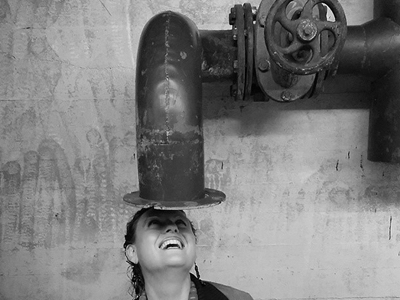
RACHEL RITS-VOLLOCH
Dr. Rachel Rits-Volloch is a graduate of Harvard University with a BA degree in Literature and holds an M.Phil and PhD from the University of Cambridge in Film Studies. She wrote her dissertation on visceral spectatorship in contemporary cinema, focusing on the biological basis of embodiment. In 2016-2017, Rachel Rits-Volloch was Visiting Professor at the Bauhaus University, Weimar, lecturing in the MFA program “Public Art and New Artistic Strategies” and the PhD program in Artistic Research. Rachel Rits-Volloch founded MOMENTUM in 2010 in Sydney, Australia, as a parallel event to the 17th Biennale of Sydney. MOMENTUM moved to Berlin in January 2011, and since that time has evolved into a non-profit global platform for time-based art, with headquarters at the Kunstquartier Bethanien Art Center. MOMENTUM’s mission is to continuously reassess the growing diversity and relevance of time-based practices, with an aim to act as a bridge between international art communities, supporting artists and artistic innovation in Berlin and worldwide. MOMENTUM’s program is composed of local and international Exhibitions, Artist and Curator Residencies, Video Art in Public Space Initiatives, a Performance Program and Archive, an Education Program and Archive, and a growing Collection. Since MOMENTUM’s inception in May 2010, Rachel Rits-Volloch has curated or produced over 70 international exhibitions showing works by over 500 artists, in addition to ancillary education programming, artist residencies, and related projects. Born in Riga, USSR, Rachel Rits-Volloch is currently based in Berlin, having previously lived and worked in the US, UK, Amsterdam, Tokyo, Istanbul, and Sydney.
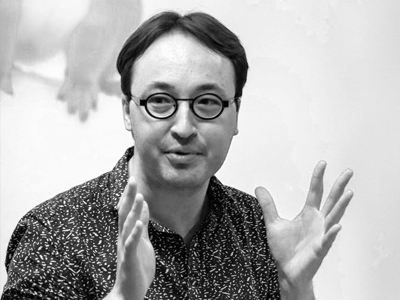
Nari Shelekpayev
Nari Shelekpayev is the 2018 Einstein Fellow at the Einstein Forum and Daimler & Benz Foundation; an Associate Fellow at the International Research and Training Group ‘Diversity’ (2016-2019) formed by Universities of Trier-Saarland and Université de Montréal; and Visiting Professor at the Università di Roma La Sapienza (Musicology Department, 2/2018-3/2019). In the past, he was Doctoral Fellow-in-Residence at the Canadian Center for Architecture; Research Fellow at Free University of Berlin (2016-2017), and has held numerous other academic positions. Shelekpayev completed PhD thesis on: “Ottawa, Brasília, Astana: the Invention of post-Colonial Capital Cities, 1850-2000.”
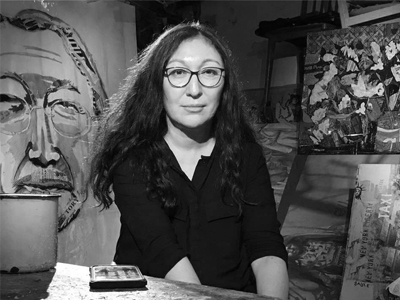
Saule Suleimenova
Saule Suleimenova: Born 1970 in Almaty, Kazakhstan. Lives and works in Kazakhstan. Saule Suleimenova graduated from the Kazakh State Academy of Architecture and Construction in 1996, and was awarded an MFA from the Kazakh National University of Arts in 2013. She has been a member of the Union of Artists of Kazakhstan since 1998. She works with mixed media, creating images and sculptures from plastic bags in a process she describes as ‘waste collage’. Residual Memory, her current project, revisits the traumatic history of Kazakhstan by recycling reproductions of little-known photo documents into collages made of waste. Still painful themes such as the Zheltoksan (the Kazakh youth riots in 1986), and the Asharshylyk (the colonial genocide resulting from Stalin’s Collectivization policies during 1932-1933), give her practice an edge of activism. Awards include: Fellowship of the President of Kazakhstan (1998); Laureate of the Shabyt, Zhiger and Tengri Umai awards; Laureate ‘For creative achievements’ in the №1 Choice of the Year, Kazakhstan, 2017; Shortlisted for the Sovereign Asian Art Prize 2017; Nominated for the Singapore Art Prize 2017; Nominated to Prince Claus Foundation Art Prize 2016. Her selected exhibitions include: Somewhere in the Great Steppe, Contemporary Art from Kazakhstan, Erarta Museum, St. Petersburg, Russia, 2017-2018; Somewhere in the Great Steppe. Skyline, National Museum of Kazakhstan. Astana, 2017. Culture Summit 2017, Abu Dhabi, UAE; Dis/Possessed. A Question of Spirit and Money, Manifesta 10, Folium, Zurich, Switzerland, 2016; One Belt One Road, Federation of Women, Sotheby’s, Hong Kong; 56th Venice Biennale in the Why Self project (2015); 5th Moscow Contemporary Art Biennale in the Migrants project of RSGU (2013); ARTBATFEST Almaty contemporary art festival (2013, 2014, 2015); East of Nowhere, Foundation 107, Turin, Italy (2009); Kazakh: Paintings By Saule Suleimenova, Townsend Center, Berkeley University, USA, 2005.
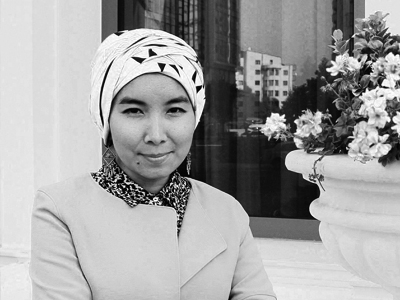
Gulmaral Tatibayeva
Born 1982, Scherbakty, Pavlodar Region, Kazakhstan. Lives and works in Astana, Kazakhstan. Gulmaral Tatibayeva received a Bachelor degree in design from the Kazakh National Academy of Arts in 2002. She is a member of the Union of Artists of Kazakhstan; the Eurasian Designers Union; the Eurasian Creative Guild; and the art group ‘KADMII QYZYL’. She has participated in many national and international exhibitions and competitions; she won the Grand Prix in the Astana city competition for the best billboard design to promote family values (2014) and has exhibited in the First Astana Art Salon; ‘Plein Air Aktobe 2015’, an international symposium of Art; the new media lab in EXPO-2017 at the Garage Museum of Contemporary Art, Moscow; AstanaArtFest, Astana Contemporary Art Centre (2015); International Festival of Contemporary Art, Design and Architecture, (2017); the Eurasia Sculpture Biennale – International Biennial Of Sculpture Art, Astana (2017); ‘Days of Culture of Kazakhstan in Turkey’, Istanbul (2017). Her works may be found in museums in Kazakhstan, and private and public collections in Kazakhstan, Jordan, Turkey, Holland, Russia, and Great Britain.
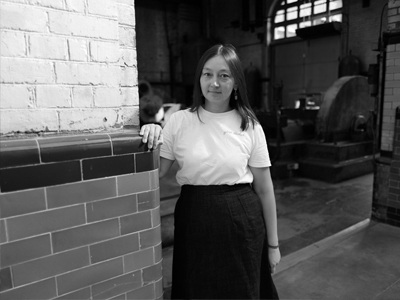
Aliya de Tiesenhausen
Aliya de Tiesenhausen, PhD, is an independent scholar of Soviet and post-Soviet Central Asian art who was born in Kazakhstan and works in London. She is the author of Central Asia in Art: from Soviet Orientalism to the New Republics, I.B. Tauris, 2016. She received her doctoral degree from the Courtauld Institute of Art, London, in 2010. She worked as an icon specialist at Christie’s London; assisted with the production of the film Kazakhstan Swings; taught theory seminars for the MA programme at the Courtauld Institute of Art; organised the Beyond Borat symposium on contemporary Kazakhstan culture; and co-convened the conferences Framing the Other: 30 Years after Orientalism at the Courtauld, and Russian Orientalism through Art Production and Education at the Cambridge Central Asia Forum. Dr de Tiesenhausen makes regular public presentations, including: The Curious Case of Kazakhstan – the Influential Role of Women in an Emerging Art Market at the Association for Art History Annual Conference (2017), and Contemporary Kazakhstani artists working abroad at the Central Asia Forum, Warwick (2018). She participated in numerous publications on these subjects, including guest editing the issue on art for the Cambridge Central Asia Reviews, Volume 1, Issue 2: pages 69-148, Cambridge Scientific Publishers, 2016. She contributed to The Eastern Connection: Depictions of Soviet Central Asia, Jérôme Bazin, Pascal Dubourg Glatigny and Piotr Piotrowski, eds.; Art beyond Borders: Artistic Exchange in Communist Europe [1945-1989], Budapest – New York, Central European University Press, 2016. Dr. de Tiesenhausen compiled sections on Kazakhstan, Kyrgyzstan, Tajikistan, Turkmenistan and Uzbekistan in the ArtAsiaPacific Almanac 2010. She also wrote the Introduction to Treasures of Kazakhstan, exh. cat., London: Christie’s, 2010.

 Back to Index
Back to Index